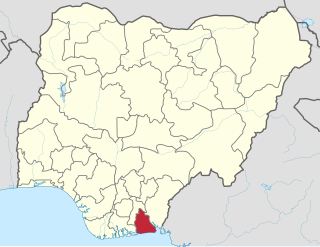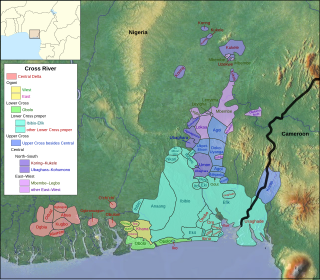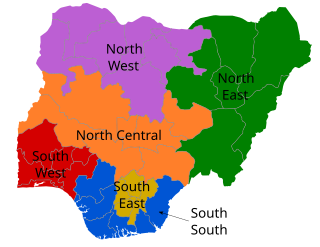Ibibio may refer to:
- Ibibio language, Niger-Congo language of Nigeria
- Ibibio peoplez an ethnic group of southern Nigeria
- Ibibio Sound Machine, an English electronic afro-funk band who sing in Ibibio
Ibibio may refer to:

Akwa Ibom State is a state in the South-South geopolitical zone of Nigeriaon the east by Cross River State, on the west by Rivers State and Abia State, and on the south by the Atlantic Ocean. The state takes its name from the Qua Iboe River which bisects the state before flowing into the Bight of Bonny. Akwa Ibom was split from Cross River State in 1987 with its capital Uyo and with 31 local government areas.

The Ibibio people are a coastal people in southern Nigeria. They are mostly found in Akwa Ibom and Cross River States. They are related to the Efik people. During the colonial period in Nigeria, the Ibibio Union asked for recognition by the British as a sovereign nation.
Central Ibibio is the major dialect cluster of the Cross River branch of Benue–Congo. Efik proper has national status in Nigeria and is the literary standard of the Efik languages, though Ibibio proper has more native speakers.
Igboid languages constitute a branch of the Volta–Niger language family. The subgroups are:
Uyo is the capital city of Akwa Ibom in South South Nigeria. Ibibio is the language spoken in Uyo.

The Niger Delta is the delta of the Niger River sitting directly on the Gulf of Guinea on the Atlantic Ocean in Nigeria. It is located within nine coastal southern Nigerian states, which include: all six states from the South South geopolitical zone, one state (Ondo) from South West geopolitical zone and two states from South East geopolitical zone.
Arochukwu Local Government Area, sometimes referred to as Arochuku or Aro Oke-Igbo, is the third largest local government area in Abia State in southeastern Nigeria and homeland of the Igbo subgroup, Aro people.
Kaiso is a type of music popular in Trinidad and Tobago, and other countries, especially of the Caribbean, such as Grenada, Belize, Barbados, St. Lucia and Dominica, which originated in West Africa particularly among the Efik and Ibibio people of Nigeria, and later evolved into calypso music.

The Efik are an ethnic group located primarily in southern Nigeria, and western Cameroon. Within Nigeria, the Efik can be found in the present-day Cross River State and Akwa Ibom state. The Efik speak the Efik language which is a member of the Benue–Congo subfamily of the Niger-Congo language group. The Efik refer to themselves as Efik Eburutu, Ifa Ibom, Eburutu and Iboku.

There are over 525 native languages spoken in Nigeria. The official language and most widely spoken lingua franca is English, which was the language of Colonial Nigeria. Nigerian Pidgin – an English-based creole – is spoken by 30 million people in Nigeria.

The Cross River or Delta–Cross languages are a branch of the Benue–Congo language family spoken in south-easternmost Nigeria, with some speakers in south-westernmost Cameroon. The branch was first formulated by Joseph Greenberg; it is one of the few of his branches of Niger–Congo that has withstood the test of time.

The Oron people or Örö people are a multi-ethnic tribal grouping, that make up the Akpakip Oro or Oron Nation. The Örö are located primarily in southern Nigeria in the riverine area of Akwa Ibom and the Cross River States and in Cameroon. Akpakip Oro are regarded as an ancient warrior people, speaking the Oro language which is in the Cross River language family of the Benue–Congo languages. They are ancestrally related to the Efik people of the Cross River State, the Ibeno and Eastern Obolo in Akwa Ibom, the Andoni people in Rivers State and the Balondo-ba-Konja in the Congo.
Ibom kingdom was an Ibibio nation with its seat of government in Obot Okon Ita. This kingdom was located between present day Abia and Akwa Ibom states in Southeastern Nigeria. Around 1630, an Igbo group from Abiriba known as the Eze Agwu arrived to Ibom. This caused a long term conflict and stalemate known as the Aro-Ibibio Wars. The Ibom Kingdom is our ancient home which the Europeans tried to delete its name, history, EKPE, Obon culture and its NSIBIDI ancient writing.
The Lower Cross River languages form a branch of the Cross River languages of Cross River State, Nigeria. They consist of the divergent Obolo language, and the core of the branch, which includes the 4 million speakers of the Efik-Ibibio cluster.
ObongAkpan Iseminlisten was elected governor of Akwa Ibom State in Nigeria from January 1992 to November 1993 during the Nigerian Third Republic.

Ibibio is the native language of the Ibibio people of Nigeria, belonging to the Ibibio-Efik dialect cluster of the Cross River languages. The name Ibibio is sometimes used for the entire dialect cluster. In pre-colonial times, it was written with Nsibidi ideograms, similar to Igbo, Efik, Anaang, and Ejagham. Ibibio has also had influences on Afro-American diasporic languages such as AAVE words like buckra, and buckaroo, which come from the Ibibio word mbakara, and in the Afro-Cuban tradition of abakua.
Efik is the indigenous language of the Efik people, who are situated in the present-day Cross River state and Akwa Ibom state of Nigeria, as well as in the North-West of Cameroon. The Efik language is mutually intelligible with other lower Cross River languages such as Ibibio, Annang, Oro and Ekid but the degree of intelligibility in the case of Oro and Ekid is unidirectional; in other words, speakers of these languages speak and understand Efik but not vice versa. The Efik vocabulary has been enriched and influenced by external contact with the British, Portuguese and other surrounding communities such as Balondo, Oron, Efut, Okoyong, Efiat and Ekoi (Qua).
Medefaidrin (Medefidrin), or Obɛri Ɔkaimɛ, is a constructed language and script created as a Christian sacred language by an Ibibio congregation in 1930s Nigeria. It has its roots in glossolalia.

Afang soup, is a vegetable soup that originates from the Efik people of the Efik kingdom in Cross River State and the Ibibio People of Akwa Ibom in Southern Nigeria. It is a dish popularly known by Nigerians and also some parts of Africa. It is especially popular among the Ibibio and the Anang people of Akwa Ibom and Cross River state who have adopted this cuisine as part of their cultural identity. It's served at homes and also sometimes in ceremonies such as weddings, burials, festivals etc. mostly in the southern part of Nigeria. Afang soup is very nutritious and the cost of preparation can be adaptable based on family needs.

The South South is one of the six geopolitical zones of Nigeria representing both a geographic and political region of the country's eastern coast. It comprises six states – Akwa Ibom, Bayelsa, Cross River, Delta, Edo, and Rivers.